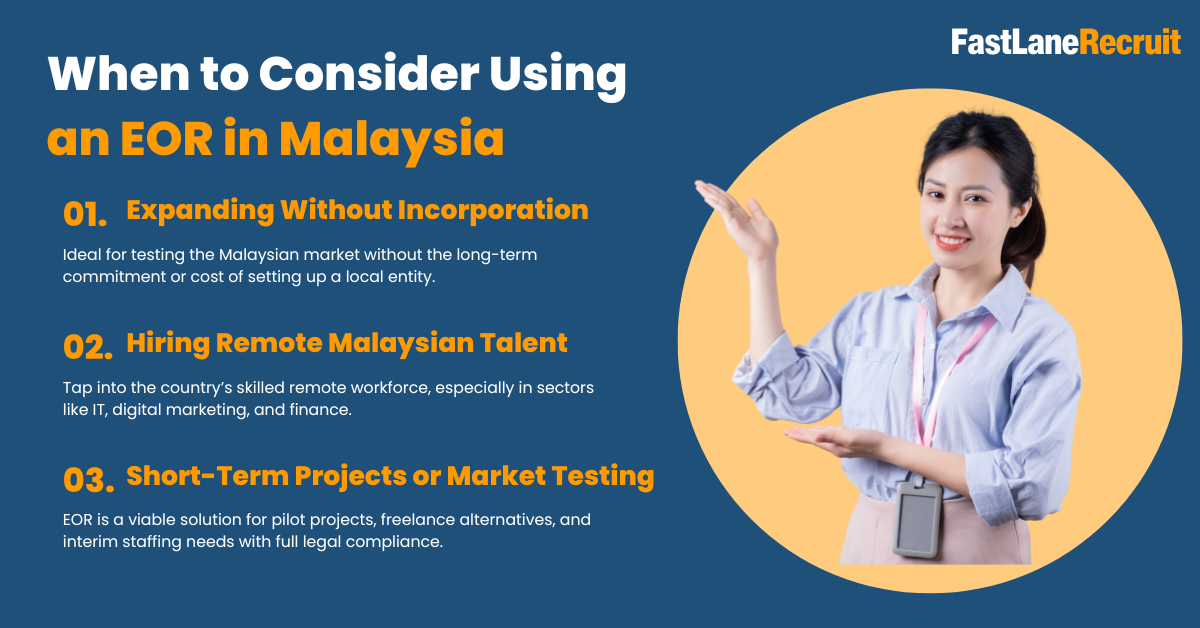Hiring in a new country can be complex especially when you’re navigating unfamiliar regulatory environments and workforce expectations. For businesses expanding into Malaysia, an Employer of Record (EOR) solution offers a strategic shortcut to employ local talent without the need for entity setup. In this guide, we will explore how to hire using EOR in Malaysia through FastLaneRecruit, with a deep dive into legal requirements, benefits, and considerations to make informed decisions.
Content Outline
Key Summary
Employer of Record (EOR) services enable businesses to hire employees in Malaysia without setting up a legal entity, simplifying market entry.
The EOR handles compliance with Malaysian labor laws, including payroll, tax, EPF, SOCSO, and statutory contributions.
Hiring through an EOR reduces administrative burden, legal risk, and time to onboard local talent.
EOR providers act as the official employer on paper, while the client company retains full control over day-to-day work and performance management.
This model is ideal for remote teams, market testing, project-based hiring, or scaling operations quickly in Malaysia.
Choosing the right EOR partner involves evaluating local expertise, compliance capabilities, data security standards, and employee experience.
FastLane simplifies cross-border hiring in Malaysia with fully compliant, cost-effective EOR solutions, tailored to your business goals.
Overview of Employer of Record (EOR) and Its Relevance in Malaysia
Defining EOR and Its Role in Global Employment
An Employer of Record (EOR) is a third-party organization that legally employs workers on behalf of another company. While the client maintains day-to-day control over the employee’s work and responsibilities, the EOR manages all legal employment obligations such as payroll, tax contributions, employment contracts, and statutory compliance.
This model allows international companies to hire in Malaysia without registering a local legal entity offering a faster and legally compliant method to access Malaysian talent.
Also Read: Benefit of Outsourcing Accounting to Malaysia
The Growing Popularity of EOR Solutions in Southeast Asia
As Southeast Asia grows as a hub for talent and innovation, countries like Malaysia attract global businesses looking for skilled workers and cost-effective expansion. EOR services are increasingly favored for their agility, enabling companies to test new markets, scale rapidly, and remain compliant with local employment laws without the overhead of setting up branches or subsidiaries.
Also Read: 5 Team-Building Tips for Your Remote Team
Why Businesses Choose EOR for Hiring in Malaysia
Avoiding Entity Setup While Expanding into Malaysia
Setting up a company in Malaysia involves registration with the Companies Commission of Malaysia (SSM), capital investment, and months of administrative work. Using an EOR bypasses these steps entirely, allowing businesses to legally employ workers almost immediately.
Visit SSM’s official site for company registration info
Simplifying Regulatory and Tax Compliance
Malaysia has strict labor laws and requires contributions to national schemes like EPF, SOCSO, and EIS. An EOR provider ensures full compliance with these laws, reducing the risk of legal penalties.
Accelerating Time-to-Hire in a Competitive Talent Market
With EOR, the hiring process is streamlined. You can tap into Malaysian talent faster, keeping you competitive in industries where time-to-hire is a critical success factor.
Understanding the Legal Framework for Employment in Malaysia
Key Employment Laws and Worker Protections
Malaysia’s Employment Act 1955 governs employment terms, minimum wage, working hours, and termination protections. Employers must comply with legal standards around leave, overtime, and worker safety.
Learn more at Malaysia’s Ministry of Human Resources
Mandatory Contributions: EPF, SOCSO, and EIS
EORs must register and contribute to the following:
| Scheme | Purpose | Employer Contribution | Employee Contribution |
| EPF (Employees Provident Fund) | Retirement Savings | 12–13% | 11% |
| SOCSO (Social Security Organization) | Work Injury & Disability | 1.75% | 0.5% |
| EIS (Employment Insurance System) | Unemployment Support | 0.2% | 0.2% |
Work Permits and Hiring Foreign Talent
Foreign employees require valid work permits and must meet immigration requirements. An EOR can sponsor and manage permit applications to ease the burden on the client company.
View immigration rules from the Immigration Department of Malaysia
How EOR Services Work in Malaysia
The EOR Hiring Process Explained Step-by-Step
- Client identifies the role and selects the candidate.
- EOR provider drafts the employment contract according to Malaysian law.
- Candidate signs with the EOR, who becomes the legal employer.
- EOR handles onboarding, payroll, and statutory contributions.
- Client manages the employee’s daily tasks and performance.
EOR vs. Traditional Recruitment: What’s the Difference?
| Feature | EOR Hiring | Traditional Hiring |
| Entity Setup | Not required | Required |
| Employment Compliance | Managed by EOR | Managed by Client |
| Time to Hire | 1–2 weeks | Several months |
| Payroll & Tax | Handled by EOR | Handled internally |
| Legal Employer | EOR | Client |
Contractual Relationship Between the Client, EOR, and Employee
The EOR is the legal employer, while the client is the operational supervisor. This tripartite relationship enables flexibility while ensuring all employment obligations are fulfilled legally and ethically.
Also Read: How to Build Your Own Remote Team
When to Consider Using an EOR in Malaysia
Expanding Without Incorporation
Ideal for testing the Malaysian market without the long-term commitment or cost of setting up a local entity.
Hiring Remote Malaysian Talent
Tap into the country’s skilled remote workforce, especially in sectors like IT, digital marketing, and finance.
Short-Term Projects or Market Testing
EOR is a viable solution for pilot projects, freelance alternatives, and interim staffing needs with full legal compliance.

Key Benefits of Hiring via EOR in Malaysia
- Risk Mitigation and Legal Compliance
EOR providers shield businesses from penalties and lawsuits by ensuring all labor laws are followed. - Simplified Payroll and Tax Administration
Monthly payroll, income tax deductions, and reporting are managed end-to-end. - Access to Local HR Expertise and Talent Pool
Gain recruitment support and HR advisory services to attract top Malaysian talent. - Scalability and Cost Efficiency
Scale your team up or down easily based on project needs or business cycles without long-term commitments.
Challenges and Limitations of EOR Hiring
- Limited Control Over Employment Terms
Since the EOR is the legal employer, direct control over employment contracts and benefits may be restricted. - Restriction in Certain Industry Types or Senior Roles
Some industries may require licensing or specific legal structures that EORs cannot support. - Dependency on Third-Party HR Infrastructure
Service quality is tied to the capability and technology of the EOR provider.
Choosing the Right EOR Provider in Malaysia
When selecting an EOR, consider the following:
- Experience and Market Knowledge
Look for providers with a proven track record in Malaysia’s labor market. - Compliance Track Record and Local Expertise
Ensure the provider is familiar with Malaysian labor laws and tax regulations. - Technology Integration and Service Offerings
Cloud-based payroll systems, automated reporting, and digital onboarding tools enhance efficiency. - Transparency in Pricing and SLAs
Clear Service Level Agreements (SLAs) and pricing models help avoid hidden costs.
Understanding Tax Implications for EOR Hiring
Corporate Tax vs. EOR Employment Costs
Unlike traditional hiring, EOR costs are typically treated as operational expenses, not taxable corporate income in Malaysia.
Withholding Taxes and Double Taxation Treaties
Malaysia has double taxation agreements (DTAs) with over 70 countries to avoid duplicate taxes. EORs must ensure proper documentation to claim benefits.
List of DTAs by Inland Revenue Board Malaysia (LHDN)
Tax Reporting Responsibilities of EOR Providers
EORs are responsible for issuing EA Forms, reporting income tax to LHDN, and handling monthly PCB (Potongan Cukai Bulanan) contributions.
Conclusion
For global businesses, EOR hiring in Malaysia offers a cost-effective, compliant, and time-efficient alternative to setting up a local entity. It bridges the gap between opportunity and execution, empowering organizations to build local teams quickly and effectively. Whether you’re entering the Malaysian market for the first time or expanding a regional hub, EOR solutions help de-risk your hiring strategy. While EOR is a perfect short- to medium-term strategy, it can complement long-term business goals by helping you scale responsibly before committing to full incorporation.
How FastLaneRecruit Can Help
At FastLaneRecruit, we offer end-to-end EOR services in Malaysia, ensuring compliance, speed, and operational ease. Whether you’re hiring one remote employee or building an entire local team, our experts will support:
- Onboarding and contract generation
- Payroll and statutory contributions
- Visa and work permit management
- HR advisory and local market insights
Let us handle the complexity so you can focus on growing your business.
Contact FastLaneRecruit today to explore EOR hiring solutions tailored to your business needs.


